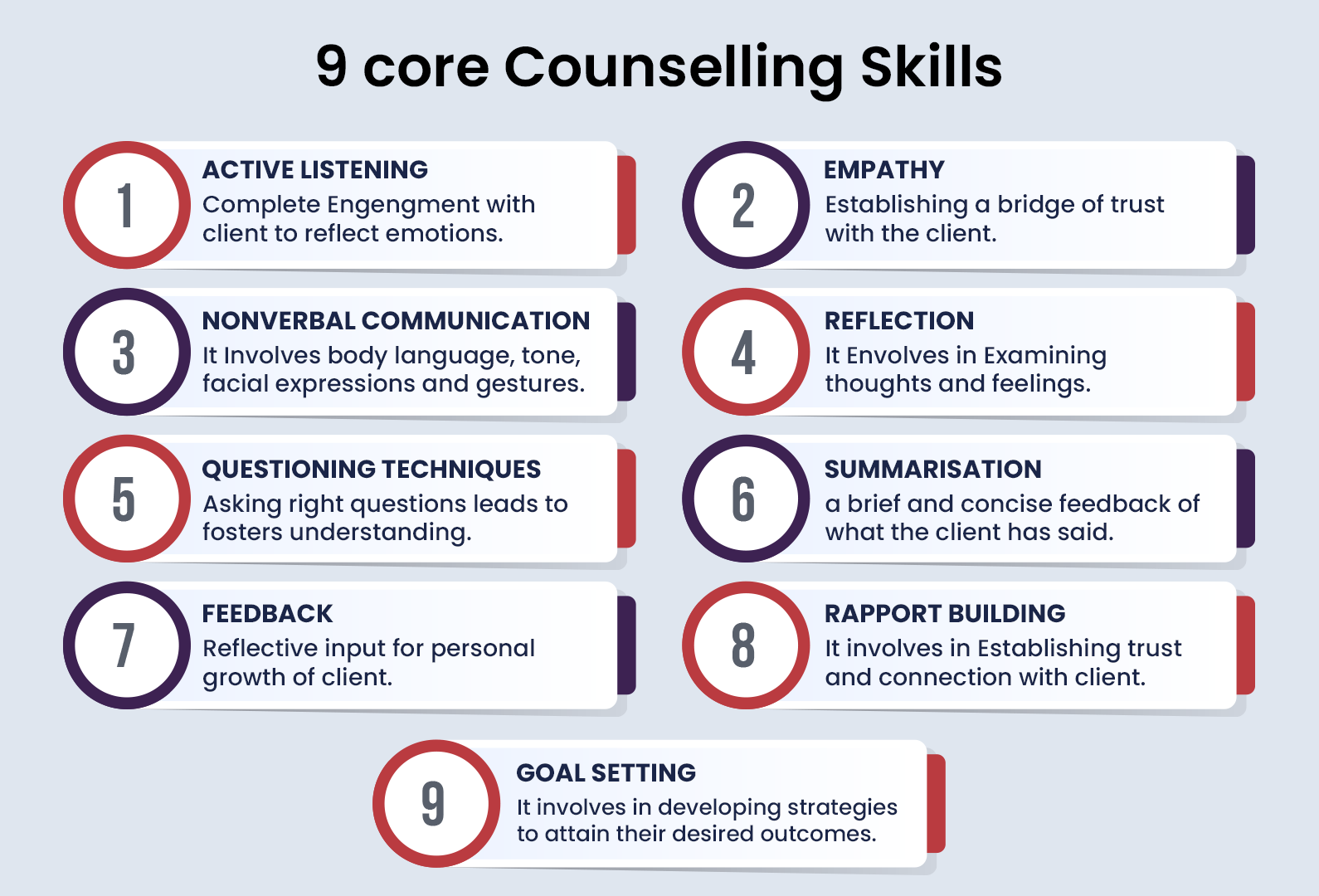Connecting with people on an emotional level involves more than just listening. To be an effective counsellor, you must be able to perceive underlying emotions and possess core counselling skills. These skills are crucial in establishing a connection with your clients and making them feel acknowledged and understood. In the realm of counselling, professionals utilize skills such as active listening and empathy to create a safe and trustworthy environment for their clients.
If you are someone pursuing a career in this field, it’s time to familiarise yourself with the below-mentioned 9 core counselling skills:
9 Core Counselling Skills
Active Listening
Active listening might be the most important counselling skill on the list because it requires complete engagement with your client, their emotions, and verbal and non-verbal language. Not only it’s important to reflect on their emotions, communicate effectively, or summarize their concerns but it is crucial to establish a trustworthy relationship with them. Additionally, active listening will help the client feel empowered and make them feel seen and understood.
Empathy
To be in someone’s shoes is easier said than done. Establishing a bridge of trust and empathy with your client is highly essential to understand what they are going through. Though it might be challenging, learning empathy will allow you to understand your client’s perspective and emotional state by practising skills like active listening and observing non-verbal cues.
Using empathy and forming therapeutic relationships during counselling will allow your client to face and deal with their emotions and find the motivation required to make important decisions in their lives.
Nonverbal Communication
In simple terms, nonverbal communication involves conveying a message without using words. By learning non-verbal communication skills, you can effectively interpret your client’s body language, tone, facial expressions and gestures.
Moreover, as a counsellor, it is important to appreciate and respect the cultural values and backgrounds of your client because we live in a diverse culture and factors like socioeconomic background play a vital role in how a client perceives themselves. By doing so, you can create a safe environment and build effective therapeutic communication where you can interpret their non-verbal communication cues.

Reflection
Reflection is the process of restating the exact or slightly different words (mirroring or paraphrasing) of your client for mainly three reasons; to show them you are actively listening and understanding their emotions, to encourage them to continue talking and to show them you are trying to understand their perspective or as they perceive the world.
Additionally, the art of reflection enables you to successfully hold the flow of conversation without damaging it.
Questioning Techniques
During counselling, asking the right questions is of utmost importance, otherwise asking the wrong questions would be detrimental to your counselling relationship. You must always ask your client open-ended questions to delve deeper and encourage detailed responses while maintaining a balance between open and close-ended questions. In doing so, you will be able to better understand your client’s concerns and foster explanation and self-expression.
Summarisation
Although summarisation and reflection may seem similar, they are distinct from each other. Summarisation can be defined as the counsellor’s feedback – a brief and concise summary of what the client has said. This being said, when summarising a client’s information, you must also pick only the most salient features and summarise it in a way that ensures you have understood their thought and concerns.
Feedback
Feedback is extremely important to guide, validate and support your client’s information. However, one thing to keep in mind is that the feedback must also be constructive and non-judgmental; you may use ‘I’ statements, which will demonstrate respect and empathy. In this way, your client will not only gain self-awareness but also navigate their personal growth easily.
Rapport Building
Building a rapport with your clients is equally important as other core counselling skills; if you do not have a good relationship with your client then there is less chance of meaningful change to occur. For rapport building, you must:
- Do not forget small or intricate details, especially if you are seeing back-to-back clients,
- Pay attention and listen without being judgemental,
- Build and maintain professional boundaries
In doing so, you may face some challenges like a lack of trust or cultural differences; however, you can address and face them by showing empathy, active listening and being sensitive to their individual needs. Consequently, you will effectively build a strong and meaningful relationship with your clients.
Goal Setting
Assisting clients in setting goals enables them to develop strategies to attain their desired outcomes. They envision a better future, overcome barriers, achieve meaningful changes and gradually make their lives better. Setting a goal is always the first to make a lasting change in your client’s personality and other aspects of their lives.
Application of Core Counselling Skills
The aforementioned core counselling skills are extremely helpful and can be applied to a range of domains facilitating emotional, personal and psychological growth. Whether it is reflection summarisation, active listening or non-verbal communication, in a therapeutic setting, a counsellor integrates these techniques to assist clients overcome and heal psychological or traumatic experiences.
Benefits of Core Counselling Skills
Once in our lives, we all go through challenging times in our lives and talking about these experiences in therapy can help us overcome and sort through these moments. Whether you are suffering from anxiety or depression, counselling is one of the best ways to help; it is beneficial for both counsellors and clients due to core counselling skills. Be it active listening, empathy or questioning techniques, utilizing these effective counselling skills, clients can experience transformative benefits and achieve successful therapeutic outcomes.
If you wish to pursue and develop a range of interpersonal and build a career in counselling skills, you can enrol on the Level 2 Certificate in Counselling Skills qualification that not only provides an opportunity to learn and interact with others but also to reflect on your personal development.
Conclusion
To sum up, core counselling skills are an incredible asset and toolkit for creating meaningful relationships and transformative connections between you and your client. These skills, encompassing feedback, summarisation, active listening, empathy or non-verbal communication all help in creating a safe space for clients to explore their emotions and concerns.


